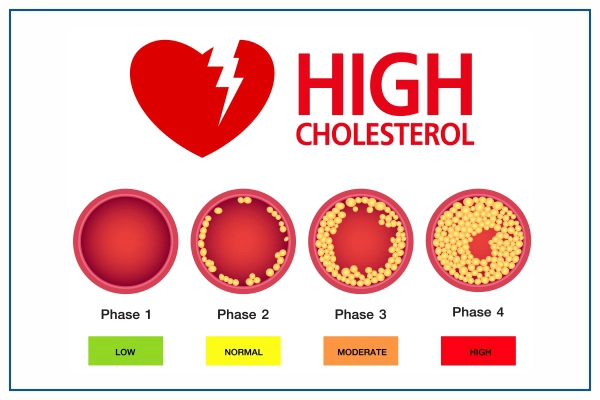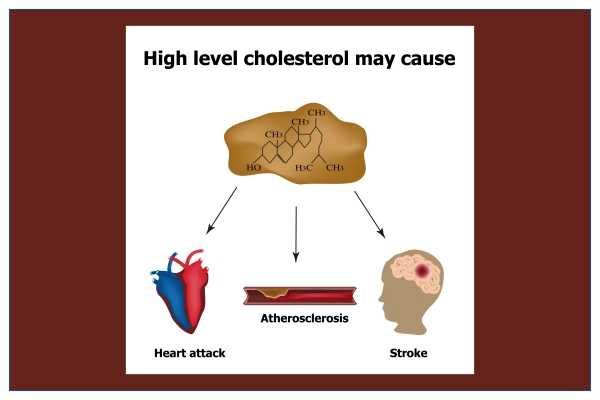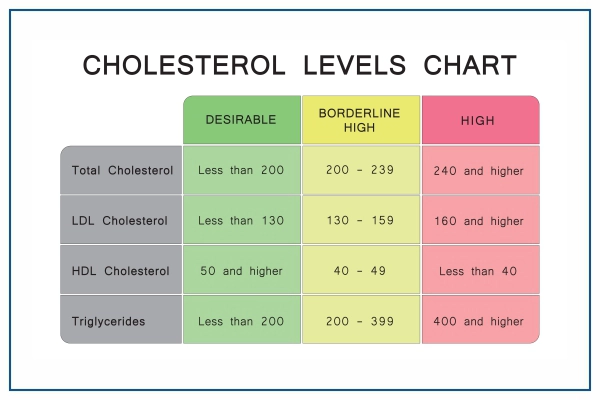What is High Cholesterol?
Cholesterol is a wax-like substance present in the blood. The body needs cholesterol to create healthy cells but when the body produces too much of it, the chances of developing heart diseases increases. In high cholesterol, the fat gets deposited in the blood vessels.
Over time, these deposits thicken and restrict the amount of blood that can pass through the arteries. These deposits can sometimes separate and create a clot that results in a heart attack or stroke.

High Cholesterol Causes
Your blood carries cholesterol that attaches to proteins. A lipoprotein is a combination of cholesterol and proteins. Depending on what the lipoprotein contains, cholesterol can be classified into many categories. These are:
- Lipids with a low density (LDL) : Lipids with a low density (LDL): LDL, the so-called "bad" cholesterol, carries cholesterol metabolites all over the body. LDL cholesterol builds up in the artery walls, hardening and constricting them.
- HDL, high-density lipoprotein (HDL) : The "good" cholesterol HDL removes extra cholesterol from your body and transports it to your liver. Triglycerides, a kind of blood fat, are often measured as part of your lipid profile. Your chances of developing heart disease may also increase if your triglyceride levels are high. Other conditions that cause unhealthy cholesterol levels are:
- Chronic kidney disease
- Diabetes
- HIV/AIDS
- HypothyroidismLupus
- Cholesterol levels can also be worsened by some types of medications for other health problems, such as:
- Acne
- Cancer
- High blood pressure
- HIV/AIDS
- Irregular heart rhythms
- Organ transplants

Secure your health with a second opinion. Make informed decisions and book your appointment today!
Get A Second OpinionHigh Cholesterol Symptoms
High cholesterol symptoms are often not noticeable, making regular check-ups essential. However, it can lead to serious health issues, such as:
- Chest pain (angina)
- Shortness of breath
- Fatty deposits on the skin (xanthomas)
- Numbness or weakness in limbs
- Heart attack or stroke
Managing cholesterol levels through diet, exercise, and medication is crucial for prevention.
Ready to take control of your health journey? Book your appointment now and start your path towards wellness today!
Book an AppointmentHigh Cholesterol Diagnosis
A lipid panel or lipid profile, a blood test used to measure high cholesterol levels, often shows Typically, you must fast for nine to twelve hours prior to the test, taking just water as a beverage.
Follow your doctor's recommendations as certain cholesterol tests don't require fasting.
- Total cholesterol
- Cholesterol LDL
- Cholesterol HDL
- Triglycerides

High Cholesterol Treatment
The first line of defence against high cholesterol is changing one's lifestyle through activities like exercises and healthy eating. However, your doctor could suggest medication if you've made these significant lifestyle changes but your cholesterol levels are still high.
The selection of a medicational drug is influenced by a number of variables, including your individual risk factors, age, state of health, and potential drug side effects. Typical High cholesterol treatment options include:
- Statins : The chemical your liver needs to produce cholesterol is blocked by statins. As a result, your liver filters cholesterol. You can choose from atorvastatin, fluvastatin, lovastatin, pitavastatin, pravastatin etc.
- Inhibitors of cholesterol absorption : The cholesterol you consume is absorbed by your small intestine and released into your bloodstream. By decreasing the absorption of dietary cholesterol, the medication ezetimibe lowers blood cholesterol levels. A statin medicine may be taken along with ezetimibe.
- Acid bempedoic : This more recent medication functions similarly to statins but is less likely to result in muscle soreness. A maximal statin dosage increased by bempedoic acid can dramatically reduce LDL. There is also a combo tablet that contains ezetimibe and bempedoic acid.
- Resins that bind bile acids : Bile acids, a component required for digestion, are produced by your liver using cholesterol. By attaching to bile acids, the drugs cholestyramine , colesevelam, and colestipol reduce cholesterol in an indirect manner. This causes your liver to produce more bile acids by using the extra cholesterol, lowering the level of cholesterol in your blood.
- PCSK9 blockers : These medications can increase the liver's ability to absorb LDL cholesterol, which reduces blood cholesterol levels. People with a hereditary disorder that results in extremely high LDL levels or those with a history of coronary disease who are intolerant to statins or other cholesterol drugs may benefit from these medications.
Avoiding high cholesterol foods such as processed meats, full-fat dairy, and fried foods can significantly improve cholesterol levels. Understanding the medical term for high cholesterol, known as hypercholesterolemia, is key to managing the condition effectively and reducing its impact on overall health.
Frequently Asked Questions
What will happen if there is high cholesterol?
An unhealthy buildup of cholesterol and other deposits on your artery walls, known as atherosclerosis, can be caused by high cholesterol. These deposits, or plaques, may reduce blood flow through your arteries, leading to issues like chest pain, stroke, and heart attack.
How can I rapidly reduce my cholesterol?
Changing your diet can reduce high cholesterol levels and improve your heart health by reducing saturated fat, eliminating trans fat, and eating foods rich in omega-3 fatty acids.
What are the best drinks to lower cholesterol?
Red wine, plant-based smoothies, soy milk, pomegranate juice, citrus juice, and green tea are some of the finest beverages for lowering high cholesterol.
What are the five symptoms of high cholesterol?
You experience dizziness, an unsteady stride, slurred speech, lower limb discomfort, or left-sided chest pain, pressure, or fullness as signs of heart disease, stroke, or atherosclerosis in other blood vessels. High cholesterol symptoms may be associated with any of these disorders, and immediate medical attention is necessary for each.
What are high cholesterol symptoms?
High cholesterol symptoms are often silent but can lead to severe conditions like heart disease or stroke. Symptoms such as chest pain, dizziness, or leg pain may appear due to complications like atherosclerosis.
What is the medical term for high cholesterol?
The high cholesterol medical term is hypercholesterolemia. It refers to elevated levels of cholesterol in the blood, which can increase the risk of heart disease and other cardiovascular conditions.
How can I manage high cholesterol levels naturally?
You can manage high cholesterol levels by adopting a healthy diet rich in fruits, vegetables, whole grains, and healthy fats while limiting processed foods and red meats. Regular exercise and maintaining a healthy weight also help in controlling cholesterol levels.
What are the foods to avoid for high cholesterol?
To manage high cholesterol, avoid foods that are high in saturated fats, trans fats, and cholesterol. These include fatty cuts of meat, full-fat dairy products, processed snacks, and fried foods. Instead, focus on high-cholesterol foods that promote heart health, such as lean proteins, whole grains, and healthy fats.
